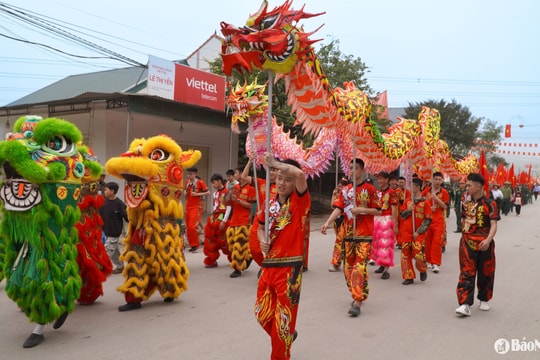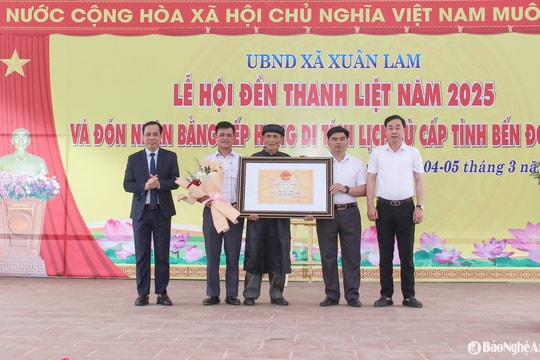Unclassified relics in Nghe An and the problem of conservation
In Nghe An province today, besides the relics that have been ranked at provincial and national levels, there are still many relics that have not been ranked, including many relics that are in a state of degradation or have been impacted to change their original elements.
Monuments at risk of becoming ruins
Located in Bac Kim Hoa hamlet, Nghi Thuan commune (Nghi Loc), Trung Hoa communal house was built in 1914, with a 5-room longitudinal house architecture. The building is not only a place for community cultural activities but is also closely associated with the local revolutionary history.
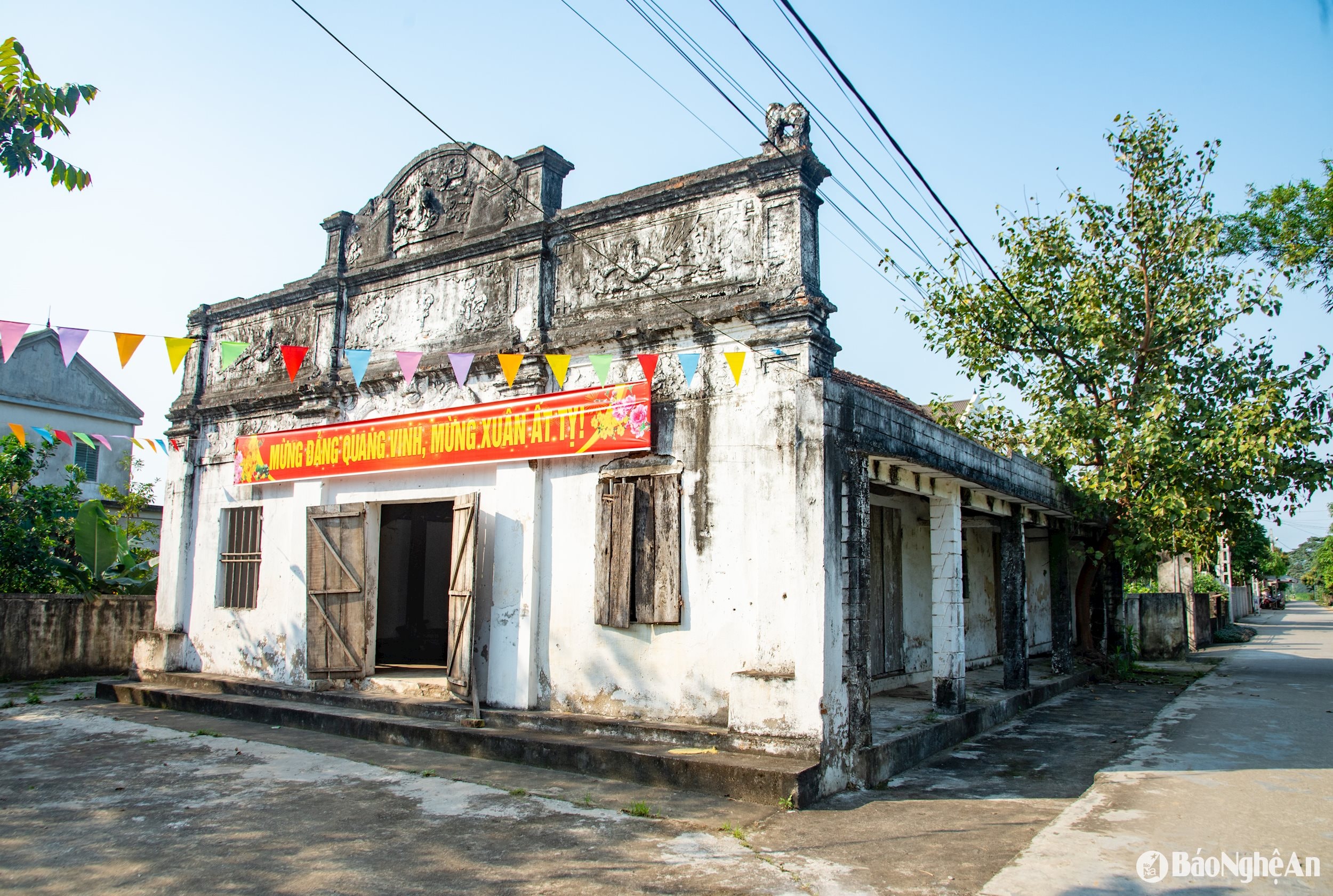
According to Mr. Dang To Ky - the volunteer who takes care of this relic, the communal house used to be a secret meeting place for cadres in the Nghe Tinh Soviet movement (1930 - 1931) and the period before the August uprising. During the resistance war against the US, this place was also the place to hold military enlistment ceremonies, memorial services for martyrs and party membership admissions.
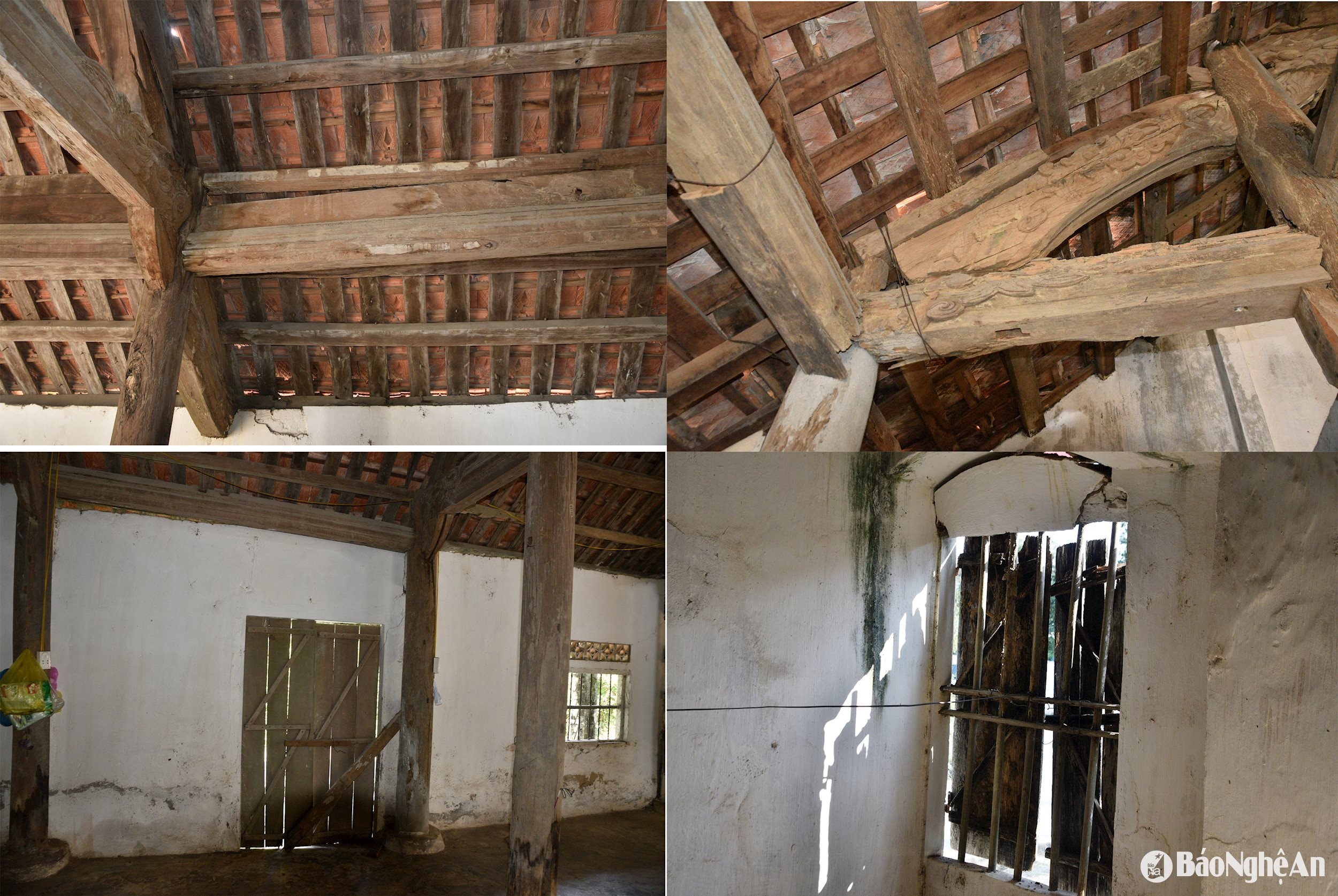
However, due to lack of documents, the communal house has not been classified as a relic and is in a state of disrepair. The roof ridge, the eaves, and the wooden pillars have been eaten away by termites; the tiled roof of the communal house is also punctured in many places. "If there is no conservation plan, Trung Hoa communal house will deteriorate more and more seriously, at risk of becoming a ruin," said Mr. Dang To Ky.
In Van Tu commune (Yen Thanh), the Tran Khac family temple - built in the 16th century - is where 18 royal decrees from the Le, Tay Son, and Nguyen dynasties are kept, along with many antiques such as incense tables, altar beds, and wooden mandarin hats. Although not yet classified, this relic has special historical and artistic value. However, 5 years ago, in February 2020, a group of descendants in the family organized to knock down the wall, dismantle the entire upper hall of the relic to move it to another place, causing the location of the ancestral temple to be changed.
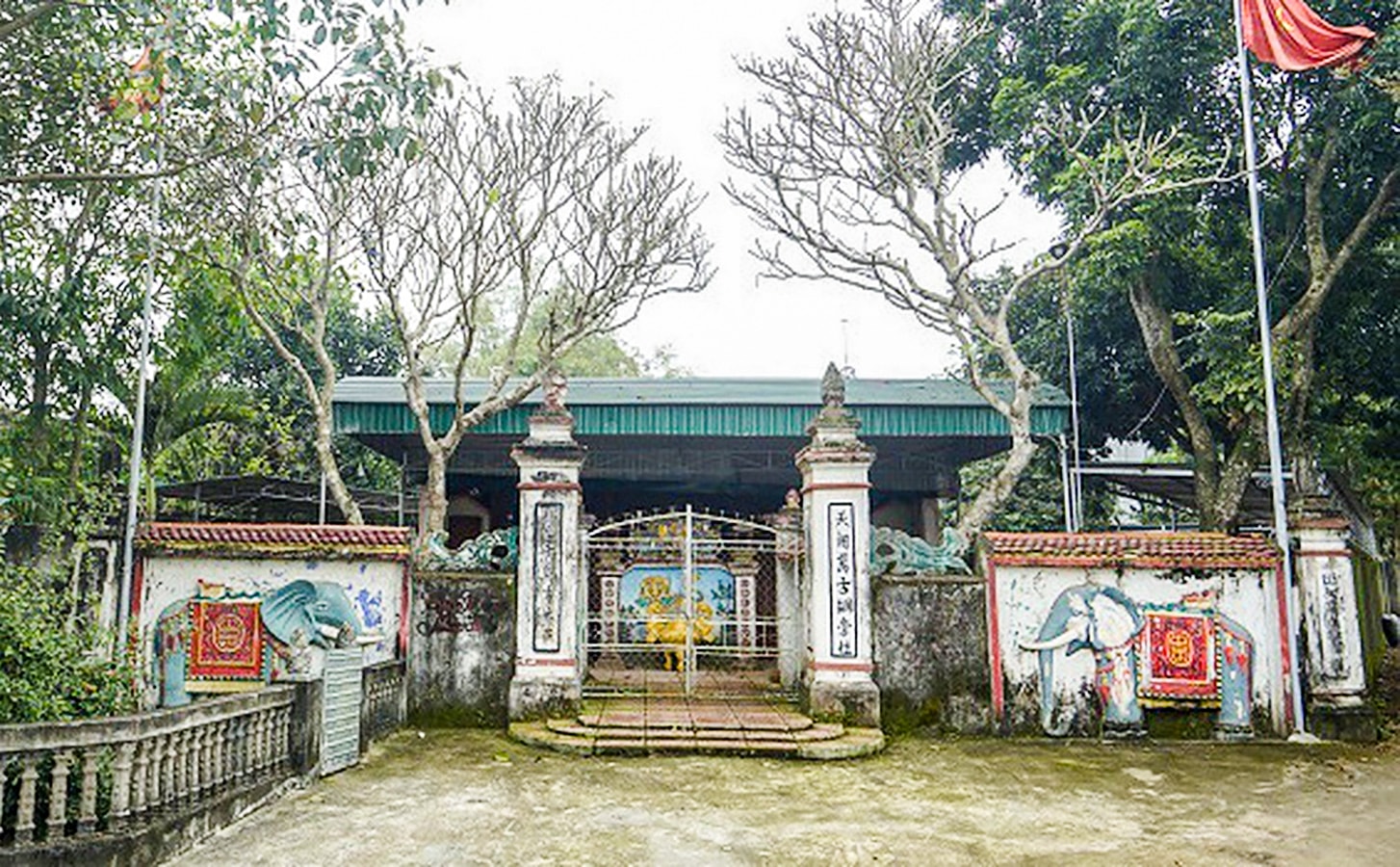
After this incident, the Center for Heritage Conservation and Tourism Development (new) and the Relic Management Board of Nghe An province (old) sent a document to the People's Committee of Yen Thanh district affirming: "The arbitrary dismantling, relocation, restoration and embellishment of the Tran Van Church relic listed in the Decision approving the Inventory List without consulting the authorities and specialized agencies is a violation of the Law on Cultural Heritage and Decision 27/2014/QD-UBND dated April 3, 2014 of the People's Committee of Nghe An province, on promulgating regulations on management, protection and promotion of the value of historical - cultural relics and scenic spots in Nghe An province".
According to the report of the Department of Culture, Sports and Tourism, through inventory, Nghe An currently has 2,602 relics, of which 500 relics have been ranked, 6 special national relics, 14 national relics, and 32 provincial relics.
Thus, in the province there are currently more than 2,100 relics in the inventory list but have not been classified. These relics not only reflect the history and culture of Nghe An but also play an important role in the spiritual life of the community. However, because they have not been classified, these relics have not received the necessary attention and protection, causing many structures to gradually deteriorate or even be encroached upon.
Difficult to call for socialization
Recently, some localities have focused on preserving unclassified relics, typically Nam Thanh commune (Yen Thanh). Mr. Hoang Van Sam - Chairman of the Commune People's Committee said that the locality currently has 6 unclassified relics, including: Cu Phu temple (Phu Son hamlet), Cua Phu temple (Tay Ho hamlet), Nha Ong Da Dieu temple, Nha Ba Dong Len temple, Nha Ong Da Moc temple and Quan Than Nong temple (all in Minh Chau hamlet).
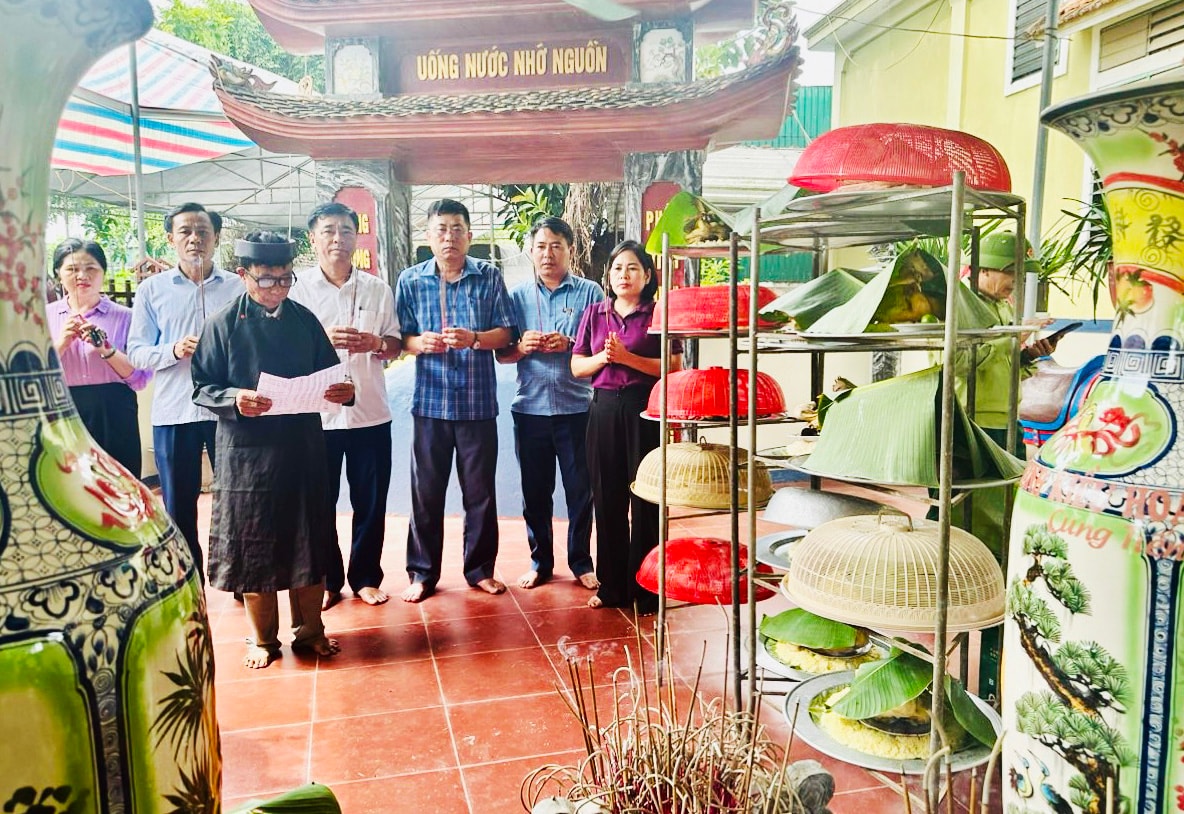
Every year, the Commune People's Committee completes the relic management board, including the leaders of the Commune People's Committee, representatives of departments, hamlet executive committees, etc. These boards are responsible for developing regulations, action plans, organizing management, protecting and promoting all tangible and intangible values of the relic. At the same time, they must take direct responsibility if there are violations of the law such as: fire, explosion, environmental pollution, loss of artifacts, loss of security and order, encroachment on land, illegal construction or distortion of the value of the relic.
According to Clause 3, Article 23 “Inventory of relics and List of relic inventory” of the Law on Cultural Heritage: Relics in the List of relic inventory are subject to measures for management, protection and promotion of value as for provincial-level relics according to the provisions of this law.
According to Article 5 of Decision No. 19/2020/QD-UBND dated July 31, 2020 of the People's Committee of Nghe An province on management, protection and promotion of the value of historical - cultural relics, landscapes and scenic spots in the province, the People's Committee at the district level is responsible for directly managing the relics or assigning them to the People's Committee at the commune level for management, except for cases that have been assigned to departments, branches, sectors or the People's Committee at the commune level. According to Article 12 of this Decision, all relics in the Inventory List must be protected in terms of land, premises and space.
However, according to the representative of the Center for Heritage Conservation and Tourism Development (new) of the Monuments Management Board of Nghe An province (old), there are still very few localities that care about preserving unclassified monuments such as Nam Thanh commune. This leads to the situation where many community monuments such as communal houses and temples are seriously degraded due to the impact of time and people. Meanwhile, relics owned by clans are exploited indiscriminately or built illegally, distorting the original elements.
A major difficulty for local authorities is mobilizing funds for preservation. For example, with Trung Hoa communal house in Nghi Thuan commune (Nghi Loc), the authorities have repeatedly called on people, children living far from home and local businesses to contribute funds for repairs. However, according to Ms. Nguyen Thi Quynh - Cultural Officer of the commune, the amount collected is only enough to repair the inner worship room, not enough to replace important components that are damaged by termites.
Mr. Nguyen Dinh Duong - Deputy Head of the Department of Culture - Science and Information of Nghi Loc district also said: "Currently, the district budget has not been allocated for the restoration of unclassified relics. Every year, the district's Department of Culture can only organize inspections and mobilize local authorities and people to join hands in preservation."
Currently, many relics, although listed in the inventory, still face difficulties in the process of ranking due to lack of documents and the complexity of the plot mapping process. On the other hand, ranking relics requires a request from the grassroots, but some local authorities are not really interested. They are afraid of being constrained by management when they want to repair or restore, leading to hesitation in coordinating to prepare classification records. Therefore, the funding for restoration and protection of unclassified relics almost entirely depends on socialization, while mobilizing this resource is still difficult.
Ms. Tran Thi Kim Phuong - Center for Heritage Conservation and Tourism Development

